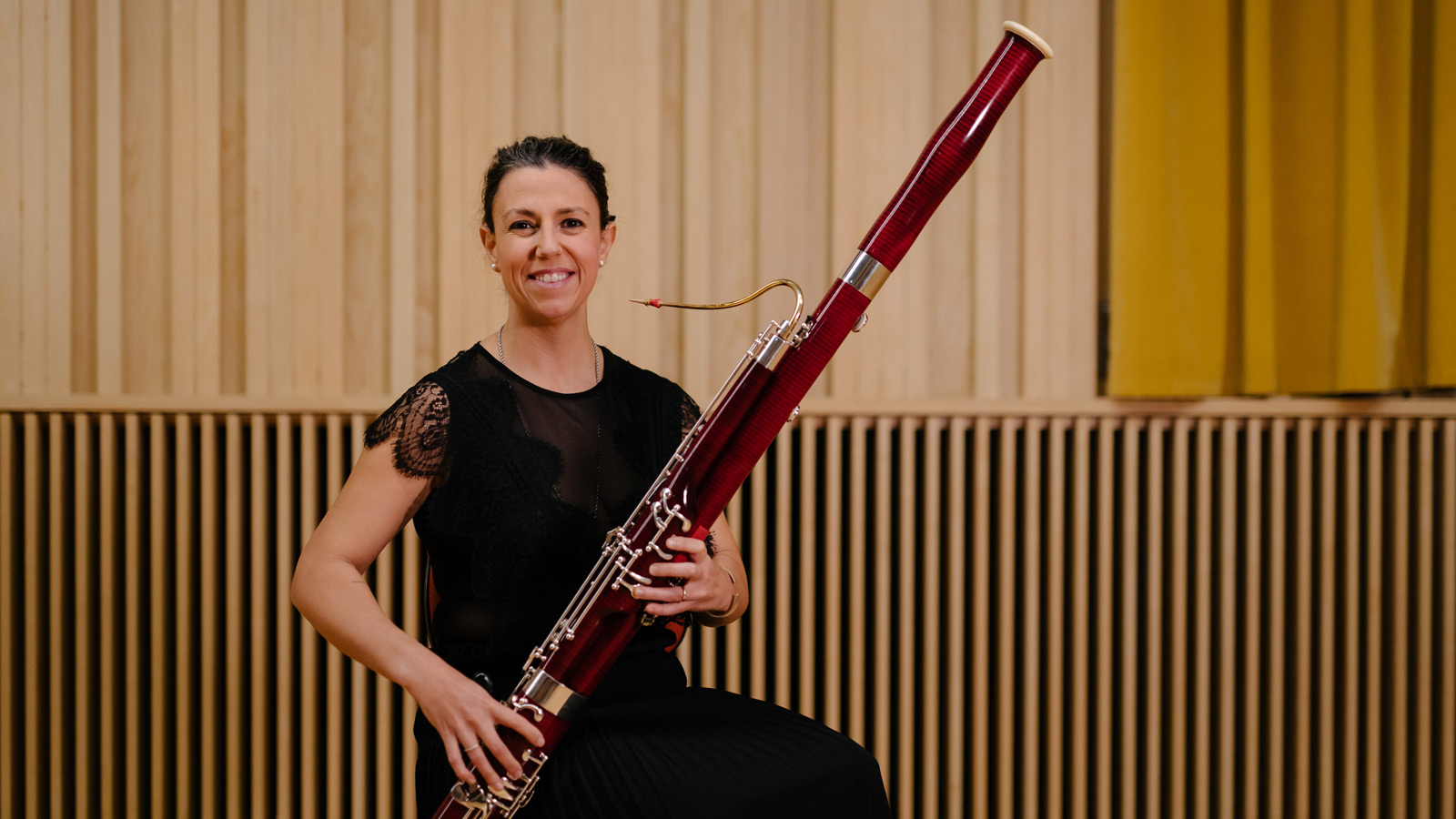Mozart and Lalo
Gulbenkian Orchestra
Event Slider
Date
- / Cancelled / Sold out
Location
Grand Auditorium Calouste Gulbenkian Foundation- Conductor
- Bassoon
- Violin
- Commentary
-
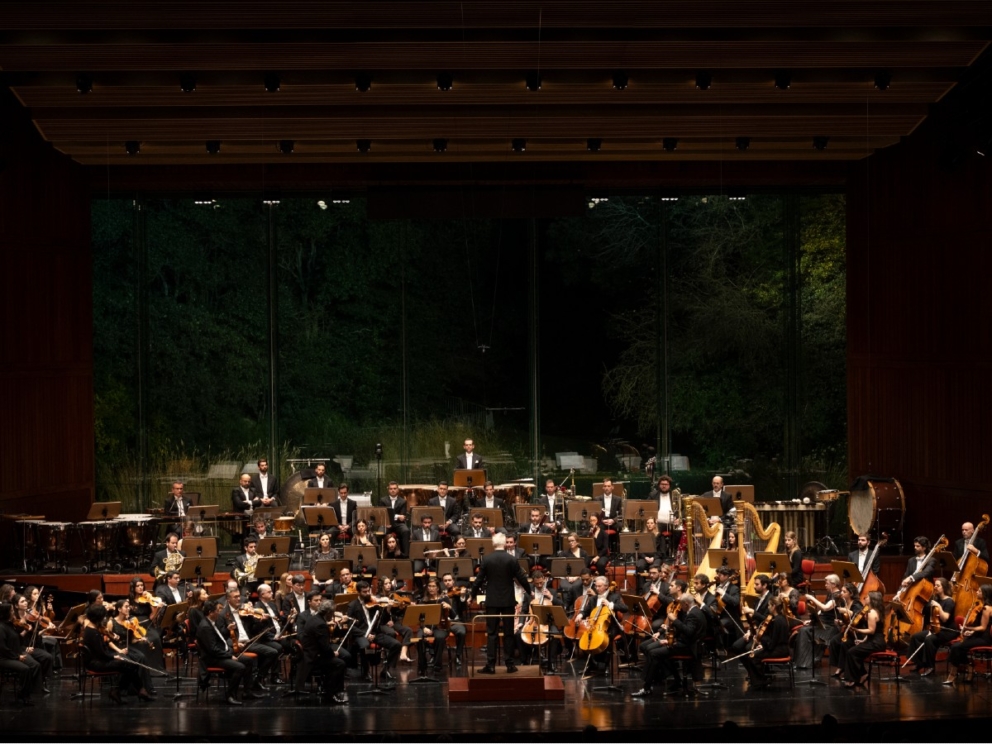
Gulbenkian Orchestra
In 1962, the Calouste Gulbenkian Foundation decided to establish a permanent orchestral ensemble. Originally with only twelve musicians (strings and continuo) it was named “Orquestra de Câmara Gulbenkian”. This collective was successively enlarged and today the “Orquestra Gulbenkian” (the name it has adopted since 1971) has a permanent body of sixty instrumentalists, a number that can be expanded depending on the repertoire.
This structure allows the Gulbenkian Orchestra to interpret works from the Baroque and Classical periods, a significant part of 19th century orchestral literature and much of the music of the 20th century, including works belonging to the current repertoire of the traditional symphonic orchestras. In each season, the orchestra performs on a regular series of concerts at the Gulbenkian Grand Auditorium in Lisbon, where it has had the opportunity of working together with some of leading names of the world of music (conductors and soloists). It has also performed on numerous locations all over Portugal, in an effort to decentralize music and culture.
The orchestra has been constantly expanding its activities in the international level, performing in Europe, Asia Africa, and the Americas. In the recording field, Orquestra Gulbenkian is associated to labels as Philips, Deutsche Grammophon, Hyperion, Teldec, Erato, Adès, Nimbus, Lyrinx, Naïve and Pentatone, among others, and this activity was recognized with several international prizes.
-
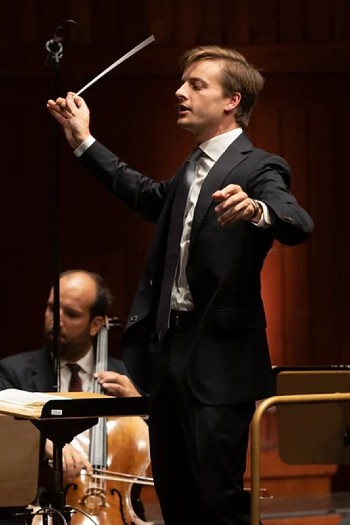
Miguel Sepúlveda
Conductor
Winner of Prémio Jovens Músicos 2022, Miguel Sepúlveda is developing an exciting career in a new generation of young conductors. In 2023 he is set to conduct the BBC Philharmonic, the Gulbenkian Orchestra, amongst others. In Portugal, he is regularly invited back to conduct, having most recently made his debut with the Lisbon Metropolitan Orchestra. By the end of the 23/24 Season he is set to have conducted all Portuguese orchestras.
In the UK he has conducted the Manchester Camerata, the New Sinfonia and been assistant conductor in the BBC Philharmonic and the Royal Liverpool Philharmonic Orchestra to such conductors as Domingo Hindoyan, Omer Meir Wellber, Vasily Petrenko, Sir Mark Elder, amongst others.
He is currently finishing his Masters at the Royal Northern College of Music with Mark Heron and Clark Rundell, where he will conduct a full performance of Mansfield Park in the Spring.
Before that, he studied with french conductor Jean-Marc Burfin at the National Superior Orchestra Academy. During these years, he was fortunate enough to play in Schostakovich Ensemble’s Anniversary Concert, getting to work with renowned musicians such as Adrian Brendel, Pascal Moraguès, Benjamin Schmid, Jan Bjøranger, Lars Anders Tomter, as well as working on the organization of CCB Classical Summer Festival.
In 2021 he won 2nd prize at the OCCO International Conducting Competition. -
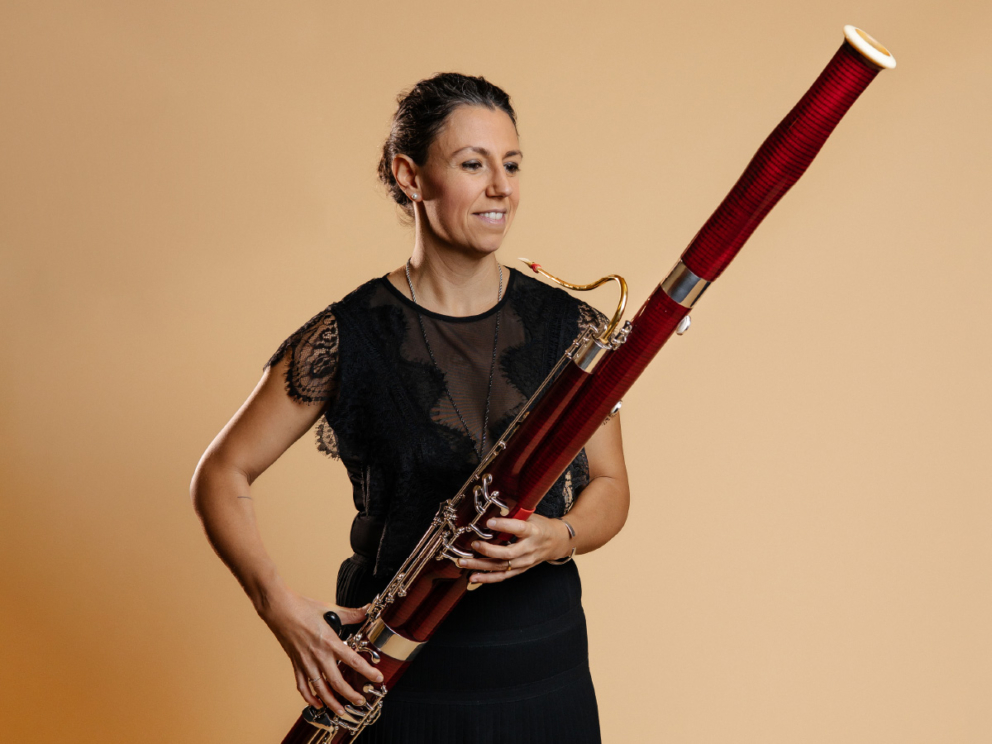
Vera Dias
Fagote
Vera Dias nasceu a 3 de abril de 1986 na cidade de Guimarães. Aos 12 anos de idade ingressou na Escola Profissional Artística do Vale do Ave – ARTAVE, onde iniciou os seus estudos musicais na classe de fagote do professor Jesus Coelho. Posteriormente estudou com o professor Paulo Martins, com quem terminou o Curso de Instrumentista de Sopro, tendo-lhe sido atribuído o prémio Dra. Manuela Carvalho pelo seu desempenho ao longo do curso. Aos 18 anos foi admitida na Staatliche Hochschule für Musik – Karlsruhe, na classe de fagote do professor Günter Pfitzenmaier. Concluiu em 2008 a licenciatura na Escola Superior de Música de Lisboa, na classe do professor Arlindo Santos. Frequentou cursos de aperfeiçoamento com os fagotistas Günter Pfitzenmaier, Henning Trog e Paulo Martins, entre outros.
Colaborou com a Orquestra Portuguesa das Escolas de Música, a Orquestra Aproarte, a Orquestra Sinfónica Portuguesa, a Orquestra de Câmara da Staatliche Hochschule für Musik – Karlsruhe, a Orquestra de Câmara de Pforzheim, a Orquestra de Câmara de Estugarda, a Orquestra Sinfonieta de Lisboa e a Orquestra Metropolitana de Lisboa, entre outras, sob a direção dos maestros Esa-Pekka Salonen, Lorenzo Viotti, Hannu Lintu, David Afkham, Réne Jacobs, Gennady Rozhdestvensky, Lawrence Foster, Philippe Herreweghe, Ton Koopman, Michel Corboz, Paavo Järvi, Péter Eötvös, Rudolf Barshai e Simone Young, entre outros, efetuando concertos em toda a Europa e no Oriente.
Em 2003 e 2004 foi selecionada para integrar a Escola de Verão da Orquestra de Jovens da União Europeia, tendo-a apenas frequentado em 2004, já que em 2003 declinou a oportunidade para poder concorrer ao Prémio Jovens Músicos, da RDP, onde recebeu o 1.º Prémio – Nível Superior, na modalidade de Fagote. Como consequência do seu desempenho no concurso, tocou a solo com a Orquestra Gulbenkian. Em 2004 foi 2.º Prémio no concurso Landespolizei, em Karlsruhe. Em 2004 gravou para a rádio alemã SWR um arranjo inédito do próprio Mozart para Octeto de sopros da ópera O Rapto do Serralho. Foi bolseira da Fundação Calouste Gulbenkian de 2003 a 2006.
Uma das suas grandes paixões é a música de câmara, colaborando sobretudo em quinteto de sopros. O seu Trio Euterpe (oboé, fagote e piano) teve um período muito prolífero, tendo-lhe sido dedicada uma obra do compositor Sérgio Azevedo, estreada no Palácio Foz, em Lisboa.
Tocou a solo com várias orquestras, incluindo a Orquestra Clássica da Madeira e a Orquestra Gulbenkian, sob a direção dos maestros Rui Massena e Krzysztof Urbański. Desde 2018 é docente na Academia Nacional Superior de Orquestra nas disciplinas de Fagote, Música de Câmara e Unidade Curricular de Orquestra - Octeto de Madeiras. Desde setembro de 2006, é 1.º Solista da Orquestra Gulbenkian.
-
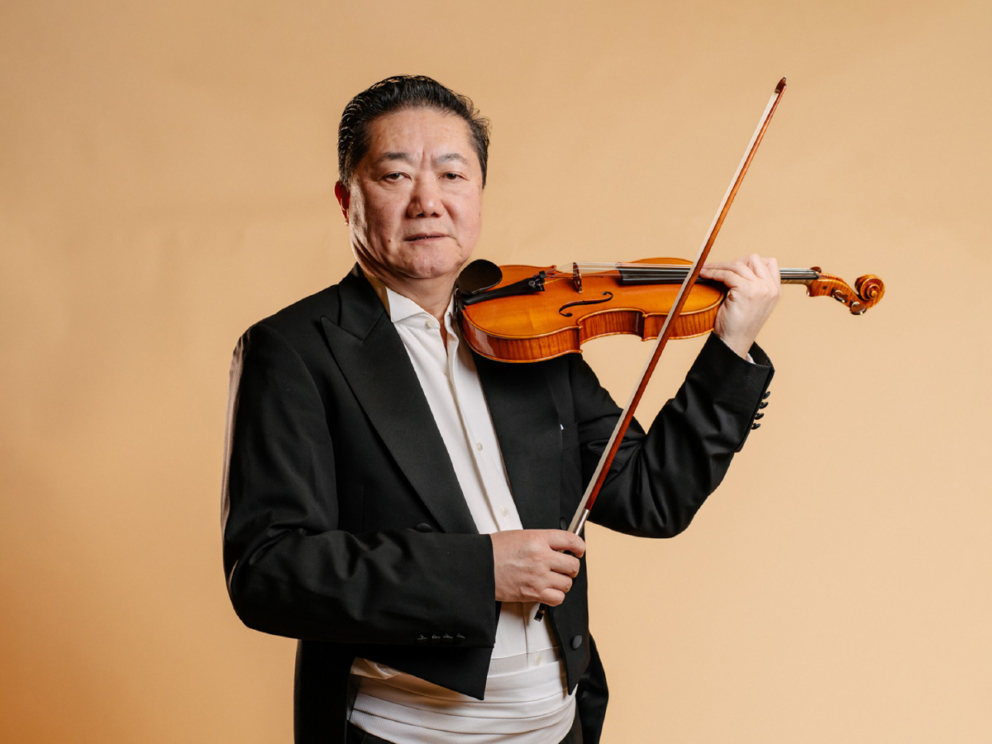
Bin Chao
Violin
Bin Chao was born into a family of musicians and began playing the violin at the age of six. He studied at the Central Conservatory of Music in Beijing, where he graduated with distinction, and he completed a Masters in Music at the Mannes College of Music in New York, where he studied with the violinist David Nadien.
Henry Roth, the violinist and music critic, praised Bin Chao's musicality and sound technique in his book Great Violinists in Performance, a book that analyses the 100 greatest violinists of the twentieth century, from the author's perspective.
In 1984 he came 2nd in the Second National Violin Competition of China. As a soloist, recitalist and chamber musician, he has performed throughout Europe and North America. He moved to Lisbon in 1991, and he has participated in the major music festivals in Portugal, as well as the Aspen Festival and the Schumann Festival in New York.
In 2001, he was a guest soloist at the prestigious Annual English Handbell Festival in New York. Between 1999 and 2001, he taught violin in New York, part of the Midori Foundation's initiative to bring music to public schools. He has taught at the University of Évora and, since 2007, has taught violin, viola and chamber music at the Piaget Institute. He has collaborated with the Conservatory of Music at the University of Lawrence in Appleton, Wisconsin, USA since 2010. Bin Chao plays a violin made by Carlo Giuseppe Testore in 1715.
-
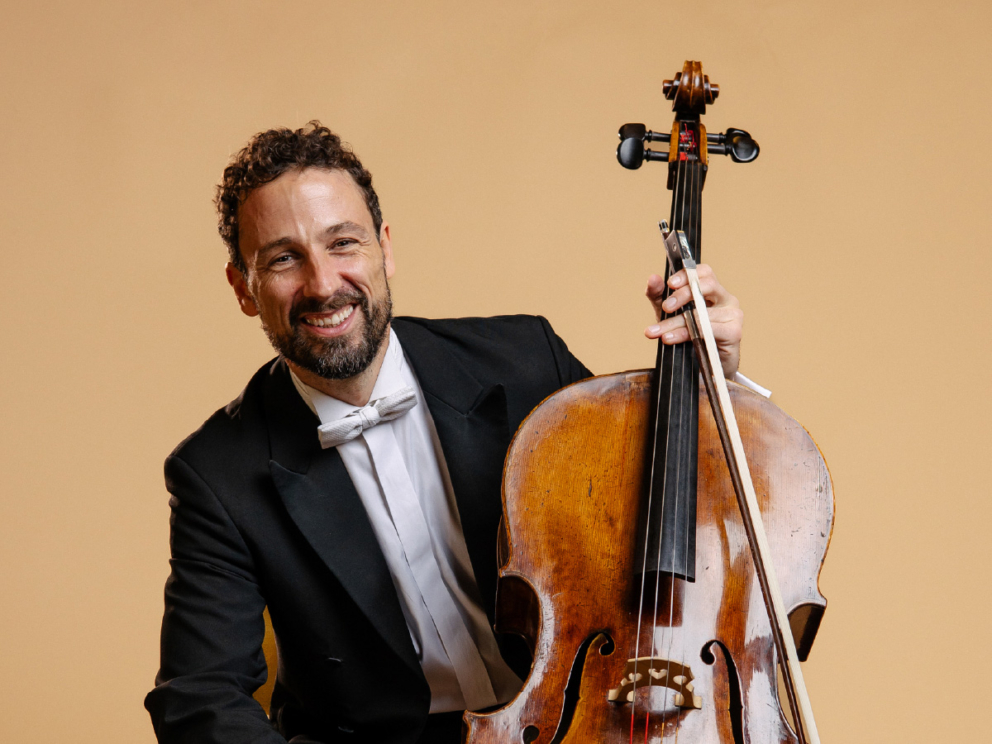
Martin Henneken
Cello
Martin Henneken received his first cello lessons at the age of six. He studied at the Musikhochschule Lübeck (Germany) with Troels Svane. He later studied with Reinhard Latzko at the Vienna University of Music (Austria) where he completed his Master’s degree with distinction. Musicians such as cellist Lynn Harrell and violinist Walter Levin (LaSalle Quartet) complemented his training. He has won awards several times at the German National Young Musicians Competition. He was a student of the Live Music Now Foundation created by Yehudi Menuhin.
During his studies, he played regularly with various orchestras, such as the Lübeck Philharmonic, the Volksoper Wien Orchestra, the Vienna Symphony Orchestra and the Symphony Orchestra of India, Mumbai. In 2009 and 2010, he was a member of the Wiener Staatsoper (Vienna Philharmonic) with which he had the opportunity to participate in recordings, international tours and festivals (Salzburg, Lucerne, BBC Proms). Since 2010, he has been 2nd Cello Soloist of the Gulbenkian Orchestra.
Wolfgang Amadeus Mozart
Le nozze di Figaro: Overture
Bassoon Concerto in B-flat major, K. 191
Édouard Lalo
Symphonie espagnole in D minor, op. 21
Winner of the Young Musicians Prize 2022, Miguel Sepúlveda conducted for the first time in the Grand Auditorium on the occasion of the announcement of the distinction that consecrates the talents that will mark the future of music in Portugal. In his debut at Gulbenkian Música, the young conductor will put his signature on the direction of two Mozart masterpieces, as well as Édouard Lalo’s Spanish Symphony, for which the French composer was inspired by the vivacity of Iberian melodies and rhythms. As soloists, two of the Gulbenkian Orchestra’s excellent musicians, Vera Dias and Bin Chao, stand out.
Sponsor Gulbenkian Music
The Calouste Gulbenkian Foundation reserves the right to collect and keep records of images, sounds and voice for the diffusion and preservation of the memory of its cultural and artistic activity. For further information, please contact us through the Information Request form.
